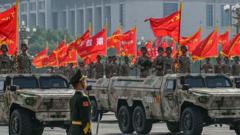Is Trump's Trade Policy Risking More Than It's Rewarding for China?

Published: 2025-09-03 22:14:18 | Category: wales
The recent military parade in Beijing, celebrating the 80th anniversary of the end of World War Two, has underscored the growing military capabilities of the People's Republic of China. This event, which showcased advanced weaponry and military prowess, has drawn attention from global leaders, including US President Donald Trump. With rising tensions and shifting power dynamics, the implications of this display extend far beyond military might, highlighting a potential reconfiguration of global alliances and trade relationships.
Last updated: 13 October 2023 (BST)
Key Takeaways
- The parade in Beijing marked a significant display of China's military capabilities.
- Trump's mixed reactions reflect concerns over a shifting global power landscape.
- The economic summit involving China, Russia, and India signals changing geopolitical alliances.
- Trump's tariffs have prompted new alignments that challenge the US-led order.
- Legal challenges to Trump's trade policies may impact future international relations.
China's Military Display: A New Era of Power
On 3 September, 2025, China hosted a grand military parade in Tiananmen Square, showcasing its modern military capabilities. This event was designed not only as a commemoration of the end of World War Two but also as a powerful statement of China's ascendance as a global power. The display featured advanced weapon systems, including missile technology and high-tech armaments, underscoring the significant investments China has made in its military over the past few decades.
The Symbolism Behind the Parade
The parade was laden with symbolism, as it sought to frame China’s role in World War Two as a critical factor in the defeat of fascism. According to the Chinese government, this narrative serves to elevate China's status on the world stage and reshape perceptions of its historical contributions. The use of military displays as a tool for national pride reflects a broader strategy to assert China's influence in international affairs.
Trump's Reactions: Mixed Signals from the Oval Office
President Trump’s comments on the parade were notably ambivalent. While he acknowledged watching the event and described it as “very, very impressive,” he also expressed grievances about China not giving the US due credit for its role in World War Two. This mixed response reveals a deeper concern regarding the implications of China's growing military strength for US global standing.
Trump’s Tariffs and Their Geopolitical Impact
Trump's "America First" trade policies have significantly altered the landscape of international trade. By imposing tariffs on various countries, including China, he has inadvertently encouraged nations like China, Russia, and India to strengthen their ties. This newly formed alignment poses challenges to the traditional US-led order, as it fosters collaboration among countries that have historically been adversaries.
Shifting Alliances: The China-Russia-India Summit
During the recent economic summit in Tianjin, Xi Jinping, Vladimir Putin, and Indian Prime Minister Narendra Modi convened to discuss economic collaboration, signalling a potential thaw in China-India relations. This development highlights how Trump's trade policies have reshaped geopolitical alliances, raising concerns among US policymakers about the implications for global stability.
Potential Risks of Trump's Trade Policies
Trump’s ambitious trade strategy may come at a cost. The recent ruling by an appellate court questioning the legality of several tariffs could dismantle the new trade regime he has crafted. The Supreme Court’s stance on these issues remains uncertain, and a reversal of his policies could have far-reaching consequences for US economic and diplomatic standing.
China's Military Power: A Growing Concern
The increasing military capabilities of China are a focal point for many countries in the Asia-Pacific region. Experts suggest that nations like Japan, South Korea, and the Philippines are now more focused on the threat posed by China's military expansion than on the economic ramifications of their trade relationships with the US.
Trump's Focus on Domestic Issues
Amidst these international developments, Trump’s attention seems to remain primarily on domestic matters. His administration has concentrated on reshaping trade policies that directly impact the US economy. However, this inward-looking approach may overlook the implications of China's military developments and its potential to reshape global power dynamics.
Conclusion: What Lies Ahead?
The military parade in Beijing serves as a stark reminder of China's ambitions on the global stage. As the US grapples with the implications of shifting alliances and new economic realities, the future of international relations hangs in the balance. The intertwining of trade, military power, and global diplomacy continues to evolve, challenging the established norms that have governed international relations for decades. As these dynamics unfold, the question remains: how will the US adapt to this rapidly changing world order?
#ChinaMilitary #TrumpTradePolicy #GlobalPowerShift
FAQs
What was the significance of the recent military parade in China?
The military parade in China marked the 80th anniversary of the end of World War Two and showcased China's advanced military capabilities, positioning the country as a rising global power.
How did Trump react to the military parade?
Trump described the parade as "very, very impressive" but also voiced concerns about China not acknowledging the US's contributions to World War Two, reflecting a mix of admiration and apprehension.
What are the implications of Trump's trade policies?
Trump's tariffs have reshaped global alliances, particularly fostering closer ties between China, Russia, and India, which could undermine the US-led international order.
What legal challenges does Trump's trade strategy face?
Recent court rulings have raised questions about the legality of Trump's tariffs, with potential implications for his trade policies and the future of US economic strategy.
How does China's military expansion affect global security?
China's military expansion raises concerns for neighbouring countries and signals a shift in global power dynamics, prompting nations to reassess their security strategies in response.



